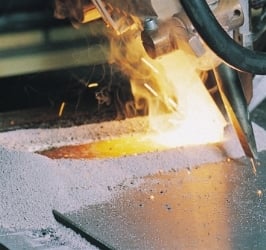Moving into the future
As the search for oil and gas reserves becomes more challenging, the need for safety and reliability is becoming increasingly critical in protecting bottom lines, workers and the work fields. ARC Specialties in Houston, Texas – in the heart of America's "Oil Patch" – is known worldwide for expert service in automated welding.
Dan Allford started ARC Specialities in his garage in 1983. Today he oversees 75 people on a 75,000-square-foot (6,900-square-meter) campus. ARC Specialties earns 20 to 25 million U.S. dollars each year designing and building state-of-the-art automated welding machinery for the oil and gas industries, as well as for construction and defense. ARC also offers consulting, laboratory and technical services.
"Customers don't bring us a request for a quote, they bring us a problem. Failure is not an option in the oil patch – the cost of failure is much too high – so we test everything here in the laboratory." says Allford.
Complex applications
In today's energy industries, drilling must go deep beneath the earth's surface where oil and gas reserves are high in hydrogen sulfide. The chemical environment creates a corrosivity that can quickly eat through drill steels and piping. ARC Specialties strengthens the metal drilling equipment by welding alloys onto the steel to extend its lifespan.
"We don't take the easy jobs. Today the problems we're trying to solve with high technology exceed the capacity of any one given material. The corrosivity in the oil fields gets more and more challenging, so we need to work with a supplier that can provide advanced material science. We're combining the properties of high-strength steel with corrosion-resistant alloys. We do that by overlaying steel with alloys using my machinery", says Allford.
Engineering expertise
 ARC's engineering consultants work closely with each client to develop, test and qualify the necessary equipment. Richard Holdren, current chairman of the American Welding Society's Technical Activities Committee, plays an important role in setting the standards for code compliance and safety in the welding industry. Holdren is also one of ARC's engineering consultants. He helps to ensure that customer equipment and applications are optimized so the equipment being delivered will operate properly and consistently and the customers' products will comply with the applicable standards.
ARC's engineering consultants work closely with each client to develop, test and qualify the necessary equipment. Richard Holdren, current chairman of the American Welding Society's Technical Activities Committee, plays an important role in setting the standards for code compliance and safety in the welding industry. Holdren is also one of ARC's engineering consultants. He helps to ensure that customer equipment and applications are optimized so the equipment being delivered will operate properly and consistently and the customers' products will comply with the applicable standards.
"All welding consumables are not equal. They all have to meet the same commercial specifications, but the manner in which they operate may not be the same. There's been constant research to develop new alloys to deal with environments where we need more protection than stainless steel will provide. Strength is critical. Having Sandvik and application specialists such as Frank Babish available to give us insight into which materials will work best in different settings, with different gases and alloy compositions, helps us determine what will give us the best end result, says Richard Holdren.
Moving into the future
ARC has dedicated cladding machines all over the world, but now Allford is exploring robotic techniques that he anticipates will revolutionize the industry.
"Our theory is that ultimately this will become a robot application. What we're starting to do here in the laboratory is develop robots to take over some of our dedicated cladding equipment applications. We're not replacing human jobs – all our machines have a human operator – but typically we can do better with a robot than we can with a human being. The parts we're working on here are preheated to a minimum of 400 degrees Fahrenheit (204 degrees Celsius). It's not a job anyone wants. Robots don't seem to mind a bit, though, so we let them do it."
Economics are only part of the picture
Allford's keen business sense extends to the foundation of his company and his field. Not only does he provide reliable products, but he's also committed to reshaping his industry, and the economy of his country, to which he clearly holds high allegiance.
"When I graduated in the early '80s, manufacturing was 28 percent of the U.S. economy, while the financial services industry was 11 percent. Within my career, that's flip-flopped, and you've seen what that did to our economy. I'm proud to be part of the renaissance in manufacturing. I like to encourage youth to consider manufacturing; it's one of the few industries that actually creates wealth, and that's what made America great.", says Allford
Allford encourages the industry to contribute
Allford trains high school students in robotics and offers internships to college students in software and mechanical and industrial engineering. He's employed two former interns, and employees interested in continuing education receive tuition assistance. He has also instituted a company-wide reuse and recycle program and pioneers energy-efficiency initiatives in his welding operations.Allford encourages other industry leaders to get involved.
It's a great program, and I encourage everyone to look into it. We need mentors, we need students, we need sponsors: that's all there is in the world."